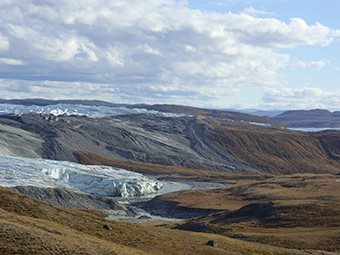
An outlet glacier of the Greenland ice sheet.
A project to assess dust released from the massive glaciers of the Greenland ice sheet has recently received £700k of funding from the Natural Environment Research Council.
With Arctic warming, increased melt from the Greenland ice sheet has caused extensive deposition of glacially-derived silt deposits along outwash plains. When the silt dries out it is very easily blown across the land onto the expanse of tundra and lakes covering the land surfaces in Western Greenland.
To date, the effects of this dust have not been studied, and now a team of researchers led by Loughborough University, and including The University of Nottingham and the British Geological survey, aim to assess whether dust can act as a fertiliser for lakes, that may be substantial enough to alter the overall terrestrial carbon cycle.
Project investigator Dr Suzanne McGowan from the School of Geography explains: "While it might seem unlikely that something as seemingly insubstantial as dust could be so important, there is emerging evidence that it may have a significant impact on lake ecosystems.
"In the Arctic, nutrients are very scarce and even small additions to nutrient budgets have the potential to fuel productivity with important implications for the carbon cycle. Dusts may also carry pollutants into ecosystems. We think we have identified an, as yet unquantified, mode of transfer among ecosystems that is likely to become more important as Arctic warming progresses."
The project entitled 'Ecological effects of glacial dust on remote Arctic Lakes' will last for three years and includes two investigators from Loughborough: Professor John Anderson and Professor Joanna Bullard, who have respective expertise in Arctic lake ecosystems and high latitude dusts.
Dr Michael Watts from the British Geological Survey (and a part of the Centre for Environmental Geochemistry) will undertake the elemental analyses to quantify the composition of the dusts. Dr Suzanne McGowan from Nottingham will undertake lake experiments to test the effects of the dusts.
The first field expedition starts in April 2017, with the setting up of a series of dust monitoring stations around the area of Kangerlussuaq, West Greenland.
Follow the project on the Arctic lakes blog.
Posted on Tuesday 31st January 2017